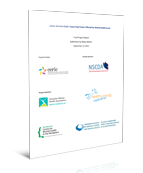
Final Report
October 15, 2015Transitions from Athletic Careers
November 18, 2015- Version
- Download 5878
- File Size 331.07 KB
- File Count 1
- Create Date October 29, 2015
- Last Updated August 26, 2021
Economic Benefits of Career Guidance
Topics covered include:
- Impact of lifelong guidance;
- Creating evidence and measuring outcomes;
- Employment impact of job search programs;
- Evaluation of career educational programs;
- Career interventions within post-secondary education;
- Business case for funding, social benefits;
- Public policy implications;
- and more.
Literature Search
The Economic Benefits of Career Guidance
Literature Search
Updated May 2017
Access Economics. (2006). The Economic Benefits of Career Development Services. Hawthorn: The Career Industry Council of Australia.
Antonelli, F. (2016). Building Futures: Career and Community Development in Small New Brunswick Towns. Journal of New Brunswick Studies. Volume 7, No. 1.
Bimrose, J., Barnes, S. and Hughes, D. (2008). Adult Career Progression and Advancement: A Five Year Study of the Effectiveness of Guidance. London: Warwick Institute for Employment Research, DfES.
Bimrose, J., Barnes, S-A., and Brown, J. (2005). A Systematic Literature Review of Research into Career-related interventions for higher education. Warwick Institute for Employment Research
Blundell, R., Dias, M.C., Meghir, C., and Reenen, J. (2004). Evaluating the employment impact of a mandatory job search program. Journal of the European Economic Association, 2(4): 569-606.
Careers England (2015). Careers guidance drives economic growth. Academy Today.
CEDEFOP, (2005). Career guidance in unstable times: linking economic, social and individual benefits. CEDEFOP.
CTE. (2016). The economic benefits of career and technical education and training in the United States. City and Guilds Group.
Fisher, G. (2016). Economic, career benefits of taking a gap year touted. CBC News.
Gillie, S. and Gillie Isenhour, M. (2003). The Educational, Social, and Economic Value of Informed and Considered Career Decisions. America’s Career Resource Network, ACRNA.
Hooley, T. (2016). The economic benefits of career guidance – Presentation to CERIC. Adventures in Career Development.
Hooley, T., and Dodd, V. (2015) The Economic Benefits of Career Guidance. Careers England.
Hooley, T. (2014). The Evidence Base on Lifelong Guidance. Jyvaskyla, Finland: European Lifelong Guidance Policy Network (ELGPN).
Hooley, T., Matheson, J., and Watts, A.G. (2014). Advancing Ambitions: The Role of Career Guidance in Supporting Social Mobility. London: The Sutton Trust.
Hughes, D. (2010). Investing in Career: Prosperity for Citizens, Windfalls for Government. Winchester: The Guidance Council.
Hughes, D. (2008). The Impact of Guidance: What do we know and how do we know this? Undervisnings Ministeriet.
Hughes, D. (2004A). Investing in Career: Prosperity for citizens, windfalls for Government. Winchester: The Guidance Council. Pp. 1-24.
Hughes, D. (2004B). Creating evidence: Building the case for career development. The Career Counsellor Journal, 16, 2.
Hughes, D. (2004). Social Mobility of Young People and Adults in England: The Contribution and Impact of High Quality Careers Services. Careers England.
Lester, J.N. (2016). Cost-Benefits of Career Development Interventions: Improving the Use . A Policy Perspective. International Symposium on Career Development.
Maguire, M. (2004). Measuring the Outcomes of Career Guidance. International Journal for Educational and Vocational Guidance. Volume 4, Issue 2, pp 179-192.
Maguire, M., and Killeen, J. (2003). Outcomes from Career Information and Guidance Services. Paris: OECD.
McCrudden, D. (2008). Social & Economic Benefits of Career Planning, National Institute of Certified College Planners, Las Vegas.
MSG (2016). Benefits of a Career Development System. MSG.
OECD (2004). Career Guidance and Public Policy Bridging the Gap: Bridging the Gap. OECD Publishing
Rice, S., Gillis, S., Leahy, M., Polesel, J. (2015). Career development: Defining and measuring quality. University of Melbourne.
Sultana, R.G. (2014). Pessimism of the intellect, optimism of the will? Troubling the relationship between career guidance and social justice. International Journal of Educational and Vocational Guidance, 14(1): 5-19.
Taylor, A.R. and Hooley, T. (2014). Evaluating the impact of career management skills module and internship programme with a university business school. British Journal of Guidance and Counselling, 4(5): 487-499.
Taylor, L. (2013). Cost to the Economy of Government Policy on Career Guidance: A Business Case for Funding and Strengthening Career Guidance in Schools. Careers England.
Tiao, S. (2016). The importance of an Employee Development Plan. Chronnus Blog.
Wanigasekara, W.M.S.K. (2016). Women’s Networking and Career Development: A Systematic Analysis of the Literature. International Journal of Business and Management; Vol. 11, No. 11.
Watts, T. (2016). Career Development Policy & Practice: The Tony Watts Reader. NICEC Ltd.
Watts, A.G. (2011) Policy Commentary 15A, The Coalition’s Emerging Policies on Career Guidance, Careers England
Winkle Giulioni, J. (2015). Why Learning is the New Career Development. Talent Space.
Attached Files
| File | Action |
|---|---|
| The Economic Benefits of Career Guidance Updated May 2017.pdf | Download |
